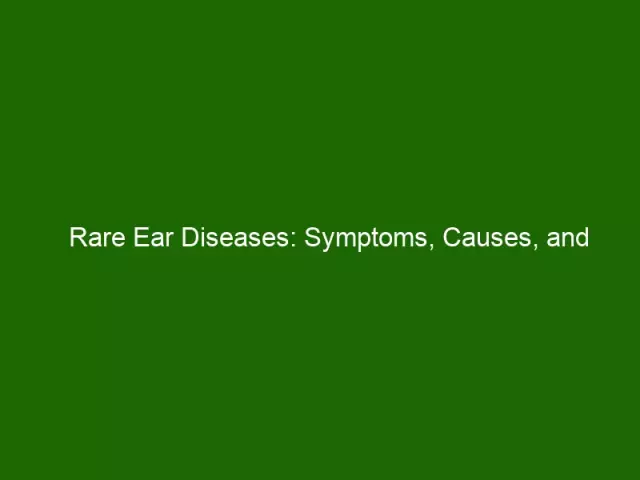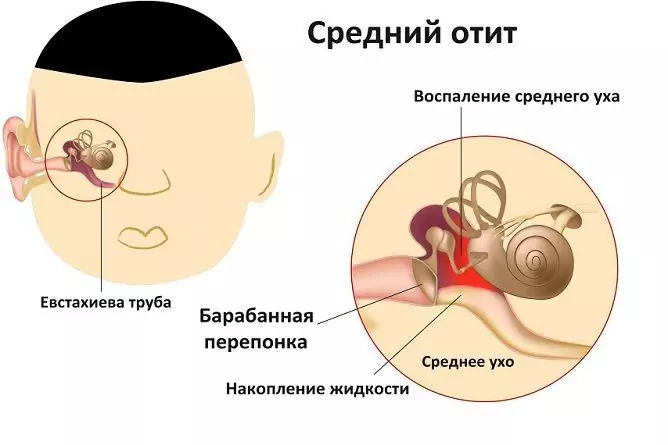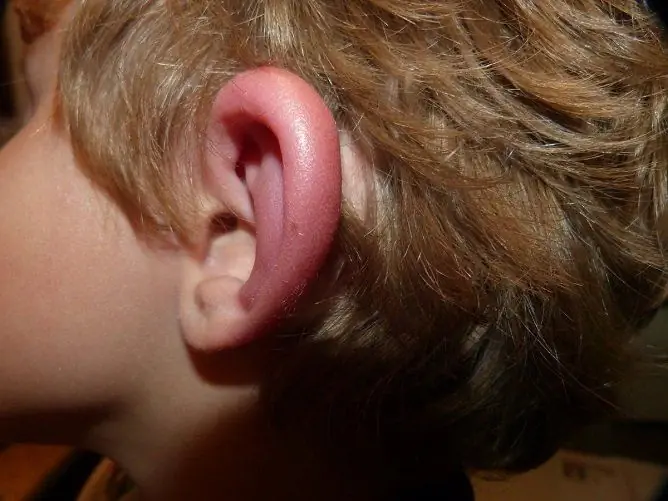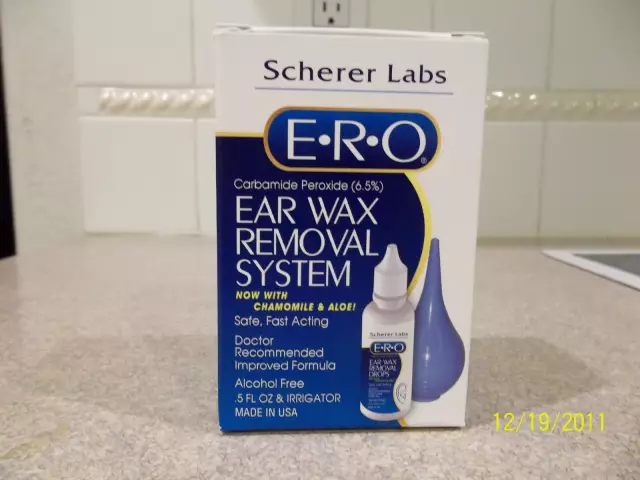- Author Rachel Wainwright wainwright@abchealthonline.com.
- Public 2023-12-15 07:39.
- Last modified 2025-11-02 20:14.
Otindole
Otindol: instructions for use and reviews
- 1. Release form and composition
- 2. Pharmacological properties
- 3. Indications for use
- 4. Contraindications
- 5. Method of application and dosage
- 6. Side effects
- 7. Overdose
- 8. Special instructions
- 9. Application during pregnancy and lactation
- 10. Use in childhood
- 11. In case of impaired renal function
- 12. Drug interactions
- 13. Analogs
- 14. Terms and conditions of storage
- 15. Terms of dispensing from pharmacies
- 16. Reviews
- 17. Price in pharmacies
Latin name: Otindol
ATX code: S02D
Active ingredient: boric acid + procaine (Acidum boricum + Procainum)
Producer: Ivanovskaya pharmaceutical factory, JSC (Russia)
Description and photo update: 2019-29-10
Prices in pharmacies: from 69 rubles.
Buy
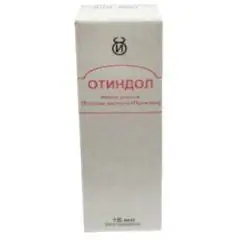
Otindole is a combination drug for the treatment of ear diseases.
Release form and composition
Dosage form - ear drops: colorless, transparent, with a characteristic odor (in a cardboard box, 1 orange glass dropper bottle, or 1 dark glass bottle, sealed with a stopper or dropper stopper, or 1 polyethylene dropper bottle, or 1 polymer can, containing 10, 15, 20 or 25 ml drops, as well as instructions for using Otindol).
Active substances in 100 ml drops:
- boric acid - 3 g;
- procaine hydrochloride (novocaine hydrochloride) - 2 g.
Auxiliary component: ethanol (ethyl alcohol) 70% - up to 100 ml.
Pharmacological properties
Pharmacodynamics
Otindol is a combined drug that has a local anesthetic, disinfectant and antiseptic effect.
Pharmacological actions of a medicinal product due to the properties of its active substances:
- boric acid: slightly irritates granulation tissues, has fungistatic, antiseptic effect;
- procaine: has a wide spectrum of therapeutic action, refers to local anesthetics with moderate anesthetic activity. Due to the fact that the substance is a weak base, it prevents the conduction of impulses along the nerve fibers and the generation of impulses in the endings of the sensory nerves, blocks sodium channels. Without exerting a pronounced effect on the resting potential, procaine changes the action potential in the membranes of nerve cells. The use of the drug serves to suppress both pain and other modality of impulses.
Pharmacokinetics
Boric acid
Boric acid is absorbed through mucous membranes, wound surfaces and damaged skin. The drug penetrates especially well through the mucous membranes and skin in young children. There have been reports of deaths after accidental oral ingestion or application of boric acid to damaged skin.
The substance is excreted slowly, cumulates with repeated applications. Almost ½ of the dose is excreted in the urine in 12 hours, the rest - over a period of 5 to 7 days.
Procaine
The drug undergoes complete systemic absorption. The degree of absorption is influenced by the place and route of administration (in particular vascularization and blood flow rate in the area of administration), concentration and amount of the final dose.
Procaine is rapidly hydrolyzed by liver and plasma esterases, while two main pharmacologically active metabolites are formed - para-aminobenzoic acid and diethylaminoethanol. Para-aminobenzoic acid is a competitive antagonist of sulfanilamide chemotherapeutic drugs and can weaken their antimicrobial properties, diethylaminoethanol has a moderate vasodilator effect.
The half-life of procaine varies from 30 to 50 seconds, in the neonatal period from 54 to 114 seconds. Excretion of the substance is mainly carried out by the kidneys in the form of metabolites. About 2% (no more) of the drug is excreted unchanged.
Indications for use
Otindol is prescribed for the treatment of external acute and chronic otitis media, not accompanied by damage to the tympanic membrane.
Contraindications
- violation of the integrity of the tympanic membrane;
- chronic renal failure;
- pregnancy;
- period of breastfeeding;
- children under 1 year old;
- individual intolerance to the components of the drug.
Otindol, instructions for use: method and dosage
Otindol ear drops are instilled into the ear canal. In order to avoid the appearance of discomfort associated with the ingress of cold liquid into the ear, it is recommended to warm the vial with the drug before use (hold it in your hand). The drug must be instilled in a patient lying with the ear turned up. After the procedure, he should remain in this position for several minutes.
For use in children, it is recommended to moisten cotton swabs in the solution and insert them into the ear canal.
Recommended dosage regimen of Otindol:
- adults: 2-3 drops in the ear 2-3 times a day;
- children over 1 year old: 1-2 drops 2-3 times a day.
The duration of the course of treatment should not exceed 7 days.
Side effects
During the period of therapy with Otindol, the development of allergic reactions is possible - desquamation of the epithelium, skin rash, convulsions, confusion; in rare cases - anaphylactic shock.
Against the background of prolonged use of ear drops, diarrhea, nausea, vomiting and headache may appear; in rare cases - a state of shock.
Also, when using the drug, local reactions in the form of burning and itching may occur, which after 1-2 minutes pass on their own and do not require discontinuation of treatment.
Adverse events, the development of which is possible with the use of Otindol against the background of a perforated tympanic membrane, include confusion, imbalance, deafness, nausea, vomiting, skin redness, urticaria, itching, edema.
Overdose
In cases of overdose of drops, prolonged therapy and the presence of impaired renal function, nausea, diarrhea, vomiting, urinary disturbances, confusion, headache, skin rash may appear. In rare cases, a state of shock may develop.
When the above symptoms appear, symptomatic treatment is performed.
special instructions
When using drops, it is important not to allow them to accidentally get on the mucous membranes.
Before starting treatment, it is recommended to make sure that there is no damage to the tympanic membrane. This is due to the fact that with a perforated eardrum, Otindol can come into contact with the organs of the middle ear and cause toxic reactions.
Influence on the ability to drive vehicles and complex mechanisms
Patients during the period of treatment should be careful when driving vehicles and conducting potentially hazardous activities, the implementation of which requires increased attention and speed of psychomotor reactions.
Application during pregnancy and lactation
Otindol is not prescribed during pregnancy / lactation.
Pediatric use
Otindol ear drops are not used in patients under 1 year of age.
With impaired renal function
In patients with chronic renal failure, the administration of the drug is contraindicated.
Drug interactions
Para-aminobenzoic acid (an active metabolite of procaine) is a sulfonamide antagonist.
Analogs
The analogue of Otindol is Otolorin.
Terms and conditions of storage
Store in a place protected from light and moisture at temperatures up to 25 ° C. Keep out of the reach of children.
The shelf life is 3 years.
Terms of dispensing from pharmacies
Available without a prescription.
Reviews about Otindole
Since the drug is rarely found in pharmacies, there are few reviews of Otindole, indicating its effectiveness.
The price of Otindol in pharmacies
The approximate price for Otindol (1 bottle of 15 ml in the package) varies between 50-100 rubles.
Otindol: prices in online pharmacies
|
Drug name Price Pharmacy |
|
Otindol ear drops 15 ml 1 pc. RUB 69 Buy |

Maria Kulkes Medical journalist About the author
Education: First Moscow State Medical University named after I. M. Sechenov, specialty "General Medicine".
Information about the drug is generalized, provided for informational purposes only and does not replace the official instructions. Self-medication is hazardous to health!


